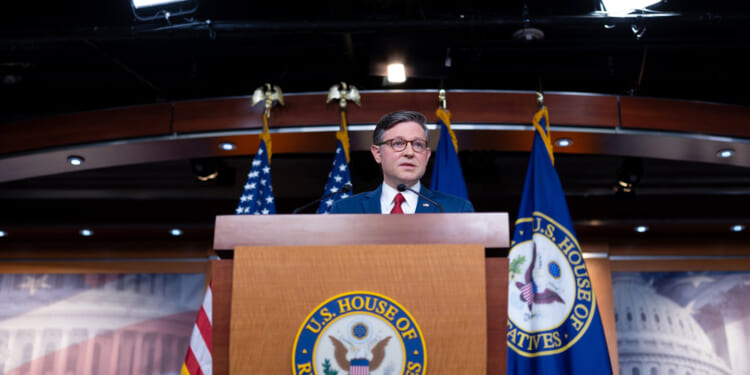The record-breaking government shutdown is almost at an end after the House voted for a new spending deal late Wednesday night, sending the bill to President Donald Trump’s desk after both Democrats and Republicans voted to reopen the government.
In a 222 to 209 vote, the House passed a short-term, Senate-passed continuing resolution to fund the government through the end of January. The bill was largely supported by the Republican conference, with a handful of Democrats joining them in voting for the bill.
Six Democrats voted for the bill: Reps. Jared Golden (D-ME), Adam Gray (D-CA), Henry Cuellar (D-TX), Don Davis (D-NC), Tom Suozzi (D-NY), and Marie Gluesenkamp Perez (D-WA).
Rep. Thomas Massie (R-KY) and Greg Steube (R-FL) were the sole Republicans who split with the party to vote against the measure.
This is the conclusion to a long shutdown saga that largely took place in the Senate, leading to a 43-day shutdown as Democrats dug in their heels to demand healthcare concessions in exchange for votes. This broke the record of the previous shutdown, which was 35 days under the first Trump administration.
Trump plans to sign the funding deal around 9:45 p.m., per the White House.
Wednesday’s vote is the first the House has taken since Sept. 19, with the chamber coming off of a 54-day recess that Democrats have blasted as an “eight-week, paid vacation” for Republicans. The GOP, in turn, has argued that they “did their job” and they would not return to Washington until Senate Democrats voted to reopen the government.
Republicans almost unanimously supported the funding legislation, despite many in the caucus often voting against continuing resolutions as a way to fund the government. Conservative House Freedom Caucus, often the thorn in the side of the leadership, sent a memo saying the bill is a “complete and total win.”
But Johnson’s continual proclamation of party unity over the course of the shutdown hit a snag on Tuesday night heading into Wednesday. Republicans became aware of a provision tucked into the spending deal that essentially allows senators to sue the U.S. government for accessing their data without their knowledge.
The Senate provision was included after it was revealed that several GOP lawmakers’ data were collected as part of a Biden-era investigation into the Jan. 6, 2021, Capitol riots.
GOP members testifying before and sitting on the Rules Committee insisted they had no idea the provision was included, and many criticized the “optics” behind it. But had Republicans wanted to alter the bill to strip the provision, it would have to go back to the Senate for approval.
So Speaker Mike Johnson (R-LA) promised a “standalone” bill on Wednesday that would repeal the provision, with a vote on the legislation to be on the “fast track suspension calendar” for next week. His statement came a half hour after Rep. John Rose (R-TN) introduced such a bill, who said “two wrongs don’t make a right.”
But there was some rising anger toward Johnson for allowing the provision to go through.
“That does nothing to change the fact that certain senators will get paid an additional $500k of taxpayer money,” Rep. Greg Steube (R-FL) said responding to Johnson’s announcement. “The Senate will never take up your ‘standalone’ bill. This is precisely why you shouldn’t let the Senate jam the House.”
Steube said leading up to the vote that he would be a “no” on the Jan. 31 CR, telling reporters that he’s “not voting to give Lindsey Graham half a million dollars.”
Johnson gave his members a 36-hour notice to return to Washington late Monday after the Senate altered the stopgap bill the House first passed in September. The original spending deal expired on Nov. 21, which quickly became an unattainable goal after the shutdown spilled over into November and gave appropriators no time to negotiate on the 12 bills needed to fund the government.
Senate Republicans were joined by seven Democrats and one independent, who caucuses with Democrats, to clear the 60-vote threshold to break the filibuster on Sunday evening. The chamber later passed the bill on Monday, sending it to the House for approval.
After 14 failed votes on the short-term bill previously passed by the House, the Senate’s version extended the funding through Jan. 31 and included a “minibus” package of three appropriations bills that would fund the Veterans Affairs and Agriculture departments, among others.
The CR notably does not include any extension of the Obamacare subsidies, which are set to expire at the end of this year — the main issue that Democrats have been fighting for, which caused backlash from voters and even some lawmakers who have argued that Senate Democrats went through the entire government shutdown to ultimately get nothing.
House Democrats slammed the Senate-passed version, as House Minority Leader Hakeem Jeffries (D-NY) introduced a discharge petition in an effort to force the speaker to hold a vote on a three year extension of the Affordable Care Act tax credits set to expire at the end of this year. The petition would need 218 signatures, which is unlikely given the House Democratic caucus sits at 214.
“The legislation that we will introduce in the context of a discharge petition will provide that level of certainty to working class Americans who are on the verge of seeing their premiums, co-pays, and deductibles skyrocket, in some cases, experiencing increases of $1,000 or $2,000 per year,” Jeffries told reporters Wednesday ahead of the vote.
Senate Republicans promised to allow a vote next month on the expiring subsidies, with no guarantee that they can pass Congress or be signed into law. Johnson has not made any promises to bring up a bill to extend the subsidies and made clear last week that he was “not part of any negotiations.”
As another concession, Republicans have agreed to reverse thousands of planned layoffs that the White House announced on Oct. 1, the first day of the shutdown.
The record-setting shutdown, which stoked partisanship, has succeeded in created a rift between Democratic and Republican leadership. Once calling each other their “good friends,” Johnson said Jeffries, along with Schumer, are “irredeemable at this point.” Jeffries said the Republicans holding daily press conferences, mainly Johnson and leadership, are “stone-cold extremist liars.”
Tensions are also rising between the top four appropriators, also known as the “Four Corners.” The Appropriations Committee is one of the few on Capitol Hill where bipartisanship is not only encouraged but essential, particularly when passing all 12 bills out of committee onto the floor, where they often receive a bipartisan vote in favor of passage.
The four corners are typically respectful and gracious of their counterparts on the other side of the aisle, but the talks leading up to the Sept. 19 vote and throughout the shutdown proved that Republicans and Democrats were on polar opposite sides.
OVERSIGHT DEMOCRATS RELEASE EPSTEIN EMAILS MENTIONING TRUMP HOURS AHEAD OF GRIJALVA SWEARING-IN
There really is a “lack of trust,” House Appropriations ranking member Rosa DeLauro (D-CT) said, noting that during a typical appropriations process, all four corners sign off on the bills, but she did not. She particularly slammed Senate Appropriations chairwoman Susan Collins (R-ME), for the Senate’s controversial lawsuit provision.
DeLauro added that her concern is, after these last few weeks proving to be more drudgery than progress, “we’re going to be here in the same situation on Jan. 30.”

















